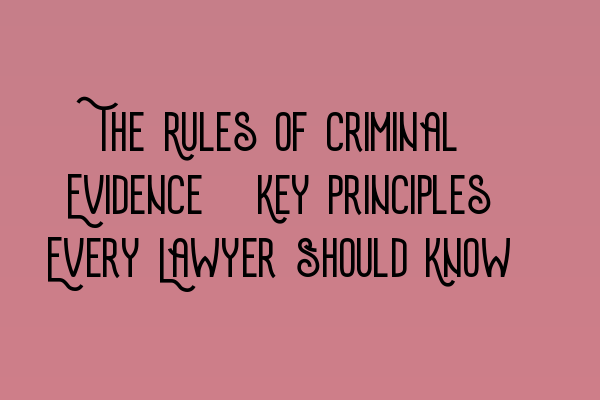The Rules of Criminal Evidence: Key Principles Every Lawyer Should Know
Welcome to SQE Criminal Law & Practice Law UK! As a lawyer, understanding the rules of criminal evidence is crucial to your success in the courtroom. In this blog post, we will discuss the key principles that every lawyer should know when dealing with criminal evidence.
1. The Presumption of Innocence
One of the fundamental principles of criminal law is the presumption of innocence. This means that a person is considered innocent until proven guilty beyond a reasonable doubt. It is the prosecution’s burden to present sufficient evidence to establish guilt.
Understanding the presumption of innocence is essential for lawyers, as it guides your approach to presenting evidence and arguing your case. It reminds you to focus on disproving the prosecution’s case rather than simply attacking the defendant’s character.
2. Admissibility of Evidence
The admissibility of evidence is another critical aspect of criminal law. Not all evidence is admissible in court, and lawyers must be well-versed in the rules that govern what can and cannot be presented to the jury.
For example, hearsay evidence, which is an out-of-court statement offered for the truth of the matter asserted, is generally inadmissible. Exceptions to this rule include dying declarations, present sense impressions, and excited utterances.
Business Regulations in the UK: A Comprehensive Overview
3. The Best Evidence Rule
The best evidence rule requires that the original or the best available evidence be presented in court. This rule aims to ensure that the most reliable and accurate evidence is presented to the fact-finder.
For example, if a party seeks to introduce a written contract as evidence, they must present the original contract unless a valid excuse exists for its absence. Copies or secondary evidence may be admissible, but they are subject to scrutiny and may be challenged by the opposing party.
LLC Formation Made Simple: Step-by-Step Guide for UK Entrepreneurs
4. Expert Opinion Evidence
Expert opinion evidence plays a crucial role in many criminal cases. It allows an expert in a specific field to provide their opinion on matters beyond the common knowledge of the average person.
However, for expert opinion evidence to be admissible, certain criteria must be met. The expert must be qualified in the relevant field, their opinion must assist the trier of fact, and the opinion must be based on reliable principles and methods.
Decoding Corporate Structures: A Comprehensive Legal Insight
5. The Right to Confrontation
The right to confrontation ensures that the accused has the opportunity to cross-examine and challenge the testimony of adverse witnesses. This right is protected by the Sixth Amendment of the United States Constitution and similar provisions in other jurisdictions.
Lawyers must be familiar with the rules surrounding confrontation, including the exceptions that allow for the admission of testimonial hearsay statements in certain circumstances.
LLC Formation: A Step-by-Step Guide for UK Entrepreneurs
Conclusion
As a lawyer, mastering the key principles of criminal evidence is essential for successfully representing your clients. Remember the presumption of innocence, be aware of the rules surrounding admissibility, understand the best evidence rule, utilize expert opinion evidence effectively, and protect your client’s right to confrontation.
For more information on the solicitors qualifying examination format, check out our article on Demystifying the Solicitors Qualifying Examination Format. If you’re interested in LLC formation in the UK, our step-by-step guides on LLC Formation Made Simple and LLC Formation provide comprehensive insights. Additionally, our articles on Business Regulations in the UK and Decoding Corporate Structures offer valuable information for legal professionals.
